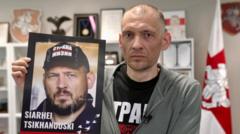Recent events in Turkey have caused concern among journalists and supporters of democracy, as multiple arrests, including that of prominent photojournalist Yasin Akgul, have sent a chilling message about government intolerance for dissent. On March 23, Akgul was arrested in a dramatic police raid at his home in Istanbul, just hours after reporting on mass anti-government protests fueled by the controversial arrest of Istanbul's opposition mayor, Ekrem Imamoglu. Akgul, who has worked extensively in volatile regions, described the fear that gripped his family during the raid, as police presented an arrest warrant without giving any details.
Turkey's Crackdown on Journalists Raises Alarm for Democratic Freedoms

Turkey's Crackdown on Journalists Raises Alarm for Democratic Freedoms
In the wake of protests against the Turkish government following the arrest of an opposition mayor, the arrests of journalists signal troubling times for press freedom and democracy in Turkey.
The protests stemmed from allegations that Imamoglu, a recognizable figure against President Recep Tayyip Erdogan’s predominantly authoritarian government, was wrongfully charged with corruption—a claim he adamantly denies. Critics believe his arrest is designed to eliminate him as a presidential contender in future elections. Despite a government ban on the demonstrations, citizens have rallied, challenging the narrative put forth by the state.
Akgul emphasized the implications of his detention, stating that it serves as a clear warning to journalists: "Don’t shoot, don’t speak, don’t film." This atmosphere of fear has resulted in a significant decrease in reporting from freelance journalists, who are wary of facing similar repercussions. The chilling effect extends beyond journalists; even legal representatives of the opposition face the threat of arbitrary arrests.
In the broader context, the Turkish government has reportedly detained around 2,000 individuals since the protests began, many of whom are young supporters of the opposition. Observers warn of an unprecedented clampdown on dissent as Erdogan's government continues to tighten its grip on power, asserting that the protests are labeled as "street terrorism." These measures showcase a systematic effort to stifle opposition voices, creating an environment that discourages political engagement.
Despite the risks, crowds have emerged at rallies across Turkey, with some reports estimating participation in the hundreds of thousands. Protesters insist they will continue to challenge the government, with calls for earlier presidential elections, as opposition polling suggests a strong potential for regenerating democracy should Imamoglu be freed.
In conclusion, the arrests of journalists like Yasin Akgul, along with broader governmental actions against dissent, illuminate a critical moment for Turkish democracy. As citizens grapple with escalating tensions, the resilience of the opposition movement remains a pivotal concern for the future of political freedoms in the country.
Akgul emphasized the implications of his detention, stating that it serves as a clear warning to journalists: "Don’t shoot, don’t speak, don’t film." This atmosphere of fear has resulted in a significant decrease in reporting from freelance journalists, who are wary of facing similar repercussions. The chilling effect extends beyond journalists; even legal representatives of the opposition face the threat of arbitrary arrests.
In the broader context, the Turkish government has reportedly detained around 2,000 individuals since the protests began, many of whom are young supporters of the opposition. Observers warn of an unprecedented clampdown on dissent as Erdogan's government continues to tighten its grip on power, asserting that the protests are labeled as "street terrorism." These measures showcase a systematic effort to stifle opposition voices, creating an environment that discourages political engagement.
Despite the risks, crowds have emerged at rallies across Turkey, with some reports estimating participation in the hundreds of thousands. Protesters insist they will continue to challenge the government, with calls for earlier presidential elections, as opposition polling suggests a strong potential for regenerating democracy should Imamoglu be freed.
In conclusion, the arrests of journalists like Yasin Akgul, along with broader governmental actions against dissent, illuminate a critical moment for Turkish democracy. As citizens grapple with escalating tensions, the resilience of the opposition movement remains a pivotal concern for the future of political freedoms in the country.



















